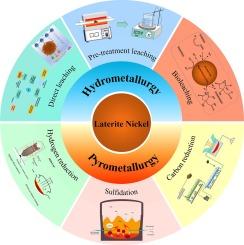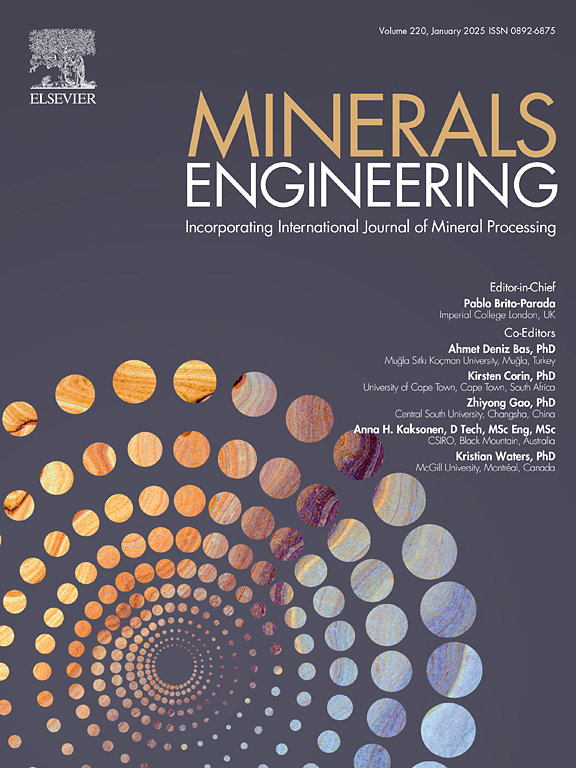Review on comprehensive utilization of nickel laterite ore
IF 4.9
2区 工程技术
Q1 ENGINEERING, CHEMICAL
引用次数: 0
Abstract
With the rise of the new energy battery industry, the demand and processing volume of nickel laterite ore—a crucial source of nickel for electrode materials—have steadily increased. This paper systematically reviews the traditional hydrometallurgical and pyrometallurgical processes used to extract valuable metals such as nickel, cobalt, magnesium, and iron from nickel laterite ore, and briefly discusses the resource utilization of acid leaching residues and ferronickel slag. Finally, it provides an outlook on future trends in nickel laterite ore processing technologies. In hydrometallurgical processes, the simultaneous leaching of impurity elements poses challenges for the recovery of nickel and cobalt, making the efficient and comprehensive recovery of valuable elements a key research focus, with iron extraction from acid leaching residues being a critical strategy. Pyrometallurgical processes face disadvantages in terms of environmental impact and energy consumption. Thus, the future development of pyrometallurgical processes should prioritize energy conservation and emission reduction. The use of renewable resources (such as biomass) and clean energy (such as hydrogen) shows promising potential. In the production of ferronickel or nickel matte, the use of additives can enhance the reduction process but significantly increases slag generation, necessitating effective strategies for resource recovery and utilization.

红土镍矿综合利用综述
随着新能源电池产业的兴起,红土镍矿--电极材料的重要镍来源--的需求量和加工量稳步增长。本文系统回顾了从红土镍矿中提取镍、钴、镁和铁等有价金属的传统湿法冶金和火法冶金工艺,并简要讨论了酸浸渣和镍铁渣的资源化利用。最后,报告对红土镍矿加工技术的未来趋势进行了展望。在湿法冶金工艺中,杂质元素的同时浸出给镍和钴的回收带来了挑战,因此高效、全面地回收有价元素成为研究重点,而从酸浸渣中提取铁则是一项关键策略。火法冶金工艺在环境影响和能源消耗方面存在劣势。因此,火法冶金工艺的未来发展应优先考虑节能减排。可再生资源(如生物质)和清洁能源(如氢气)的使用显示出巨大的潜力。在镍铁或镍锍的生产过程中,添加剂的使用可以增强还原过程,但会大大增加熔渣的产生,因此需要采取有效的资源回收和利用战略。
本文章由计算机程序翻译,如有差异,请以英文原文为准。
求助全文
约1分钟内获得全文
求助全文
来源期刊

Minerals Engineering
工程技术-工程:化工
CiteScore
8.70
自引率
18.80%
发文量
519
审稿时长
81 days
期刊介绍:
The purpose of the journal is to provide for the rapid publication of topical papers featuring the latest developments in the allied fields of mineral processing and extractive metallurgy. Its wide ranging coverage of research and practical (operating) topics includes physical separation methods, such as comminution, flotation concentration and dewatering, chemical methods such as bio-, hydro-, and electro-metallurgy, analytical techniques, process control, simulation and instrumentation, and mineralogical aspects of processing. Environmental issues, particularly those pertaining to sustainable development, will also be strongly covered.
 求助内容:
求助内容: 应助结果提醒方式:
应助结果提醒方式:


